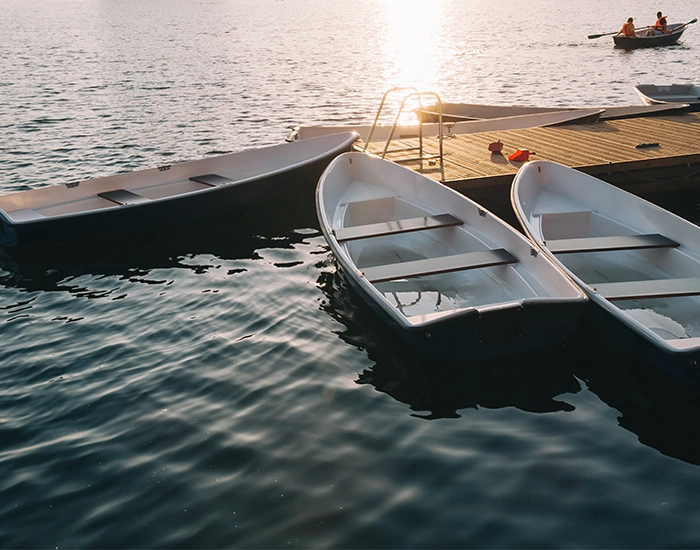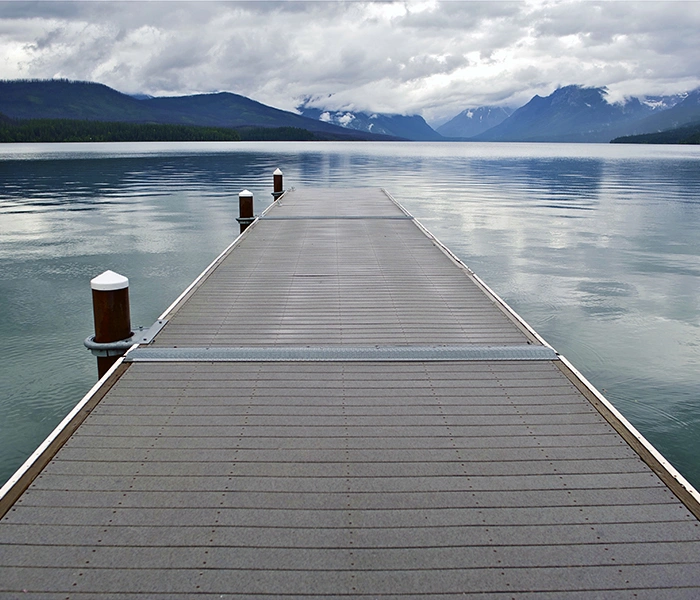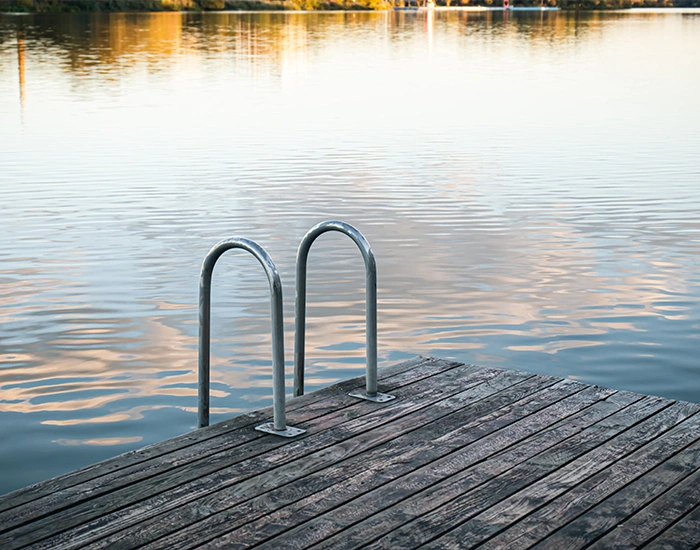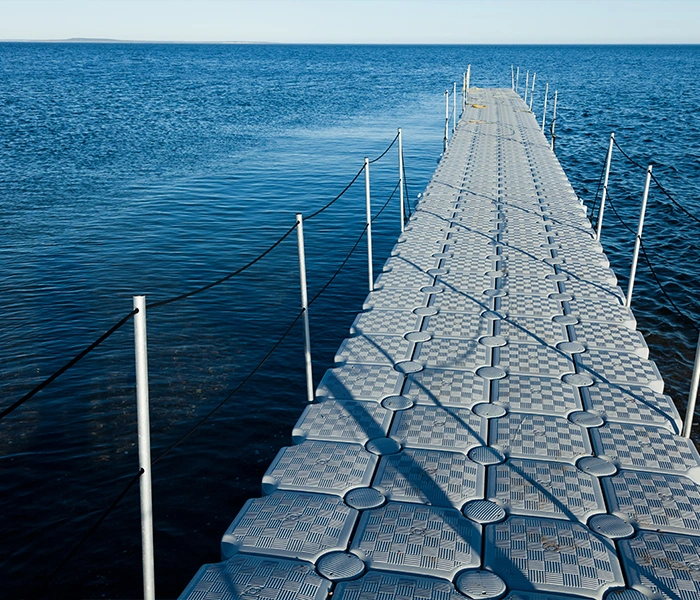What are the Different Types of Floating Dock Systems?

Modular Floating Dock Systems
Modular floating dock systems offer a practical alternative to fixed wooden, metal, and concrete docks. Their components can float and rise with changing water levels, making them ideal for shorelines that experience significant fluctuations throughout the year.
The modular design of floating docks allows owners to build the ideal structure without worrying about water depth or other environmental factors that limit a dock’s usability. They’re also less expensive than fixed docks and can be installed more quickly, allowing them to be used for boat storage, kayak launches, or PWC ports as the needs of a waterfront change.
What Makes Modular Boat Docks Unique?
Unlike docks that attach to the bottom of the lake or river, floating docks are connected to poly ramps or aluminum gangways using poly pipe brackets. These components help keep the dock in place and allow it to rise or lower as water levels fluctuate, reducing the risk of damage to boats left in the water during severe weather conditions or hurricanes. They also provide a level of shock absorption that’s more effective than single-point buoyancy, further protecting boats from damage.
Wood Floating Dock Systems
The summer is fast approaching, and while lakeside families are planning beach days, grilling s’mores, and swimming, waterfront property owners may consider upgrading their dock systems. A floating dock is an excellent option for any residential or commercial waterfront property.

Unlike stationary or permanent docks anchored to the bottom of the water, a wood floating dock system floats on a series of high-density floats. The floats ensure the dock is at the proper height above the water for boating and swimming, and they can adjust to rising or falling water levels.
Choosing the best dock type will depend on the property’s needs, location, dock materials, and expected use. For example, if the dock will be used to store boats and recreational equipment, the system must be designed for these heavy items.
With over 25 years of combined experience
Foothills Docks are experts when it comes to building docks.
What Makes Wood Floating Dock Systems Unique?
Wooden floating docks are special because they look natural, last a long time, and can be used in many different ways. They are made from strong wood that can easily handle different weather and can also blend in with the natural beauty of the waterfront. Because they float, they can work at different water levels, like rivers or lakes. Also, they give you a safe and steady space for things like fishing and boating, and they have a classic look, too.

Aluminum Floating Dock Systems
Stationary docks have the advantage of adjusting to changing water levels, making them ideal for bodies of water subject to fluctuating conditions, like rivers, seas, or lakes. Additionally, they do not disrupt the seabed and are less disruptive to aquatic plants and animals than fixed docks.
Typically, aluminum and steel floating dock systems feature a sturdy frame made of aluminum tubing interconnected by polyethylene floats with rotationally molded box-shaped floatation for incredible stability. Because of their durability, aluminum docks can be used in areas exposed to harsh marine conditions and can last for decades with minimal maintenance.
Besides residential use, various industries and governments can also utilize floating docks. Governmental properties and emergency management agencies often use these systems for on-the-water work activities, providing superior safety for personnel and equipment and flexibility in changing water conditions.
Additionally, they minimize sediment damage, offer an extended lifespan, and are easy to move during off-season storage. The versatility of floating docks is unparalleled by types of floating docks, making them a practical choice for many waterfront property owners.
Concrete Floating Dock Systems
Using concrete floating dock pontoons allows marinas to have a strong, sturdy system that will not rust. Construction Products has a large selection of these modular floating docks shipped in sections for on-site assembly. They are designed for fresh and saltwater applications and can be designed to fit any dock configuration needed.
DOCK RE-SURFACING
What Makes Concrete Floating Dock Systems Unique?
Concrete floating docks are unique because of their durability, stability, and low maintenance requirements. Unlike traditional wood docks, concrete floating docks are resistant to corrosion, rot, and weather-related damage, making them perfect for harsh environmental conditions.
Concrete floating docks’ solid construction provides better stability and buoyancy, confirming a reliable platform for various water activities. Concrete docks can also be customized to fit specific needs and designs, offering functionality and aesthetic appeal. Their long life and minimal upkeep make them a cost-effective as well as a practical choice for waterfront applications.


Plastic Floating Dock Systems
A modern dock system is a great way to add space to store and dock your boat and personal watercraft, lounge, grill, and entertainment. Unlike traditional fixed and removable docks secured with piling, plastic docks are buoyant and can withstand high levels of stress and pressure. They also require less maintenance than fixed wooden docks, prone to rot, warping, splinters, and corrosion.
Plastic Floating docks are great for residential and commercial properties, especially lakes, ponds, and other bodies of water where the ground level is unstable or freezes each winter. They also offer safe, reliable access to boats and other watercraft during high tides and floods, preventing them from becoming inaccessible due to fluctuating water levels.
Conclusion
Foothills Docks: Expert Boat Dock Installation & More
Ready to ensure the safety and longevity of your waterfront infrastructure? Look no further! Foothills Docks now offers comprehensive services, including lift repair and removal, dock repair, dock cleaning and oiling, and expert resurfacing. Contact us today to schedule a consultation and experience the difference our professional services can make!

